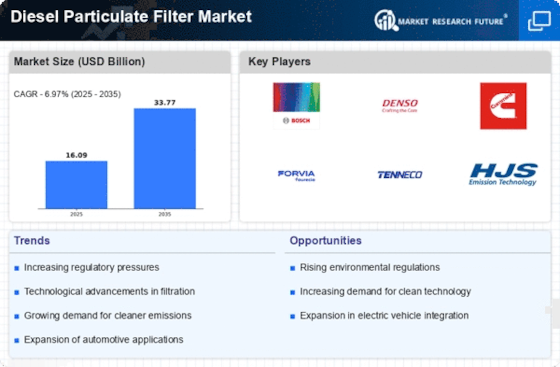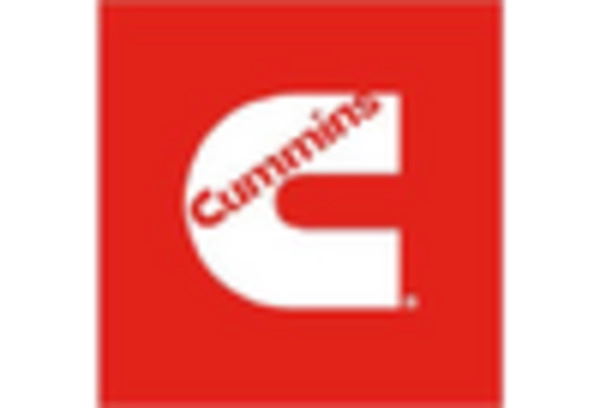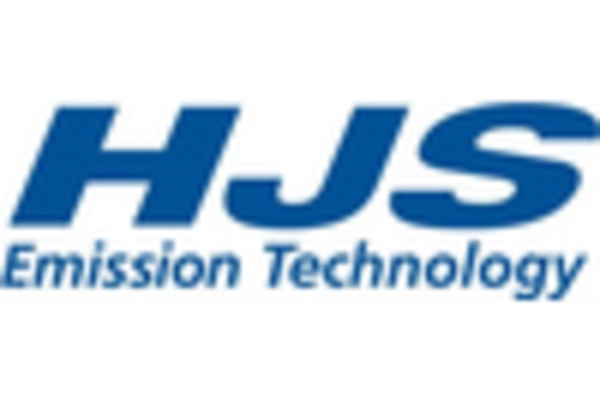Passenger Vehicles
Light Commercial Vehicle (LCV)
Heavy Commercial Vehicle (HCV)
Off-Highway Vehicle
Regenerating Type Filters
Disposable Type Filters
Cordierite Wall Flow Filters
Silicon Carbide Wall Flow Filters
Ceramic Fiber Filters
Other Substrates
Original Equipment Manufacturer (OEM)
Aftersales
Diesel Particulate Filter Market by Vehicle TypePassenger Vehicles
Light Commercial Vehicle (LCV)
Heavy Commercial Vehicle (HCV)
Off-Highway Vehicle
Diesel Particulate Filter Market by Product TypeRegenerating Type Filters
Disposable Type Filters
Diesel Particulate Filter Market by Material TypeCordierite Wall Flow Filters
Silicon Carbide Wall Flow Filters
Ceramic Fiber Filters
Other Substrates
Diesel Particulate Filter Market by Sales ChannelOriginal Equipment Manufacturer (OEM)
Aftersales
Diesel Particulate Filter Market by Vehicle TypePassenger Vehicles
Light Commercial Vehicle (LCV)
Heavy Commercial Vehicle (HCV)
Off-Highway Vehicle
Diesel Particulate Filter Market by Product TypeRegenerating Type Filters
Disposable Type Filters
Diesel Particulate Filter Market by Material TypeCordierite Wall Flow Filters
Silicon Carbide Wall Flow Filters
Ceramic Fiber Filters
Other Substrates
Diesel Particulate Filter Market by Sales ChannelOriginal Equipment Manufacturer (OEM)
Aftersales
Diesel Particulate Filter Market by Vehicle TypePassenger Vehicles
Light Commercial Vehicle (LCV)
Heavy Commercial Vehicle (HCV)
Off-Highway Vehicle
Diesel Particulate Filter Market by Product TypeRegenerating Type Filters
Disposable Type Filters
Diesel Particulate Filter Market by Material TypeCordierite Wall Flow Filters
Silicon Carbide Wall Flow Filters
Ceramic Fiber Filters
Other Substrates
Diesel Particulate Filter Market by Sales ChannelOriginal Equipment Manufacturer (OEM)
Aftersales
Diesel Particulate Filter Market by Vehicle TypePassenger Vehicles
Light Commercial Vehicle (LCV)
Heavy Commercial Vehicle (HCV)
Off-Highway Vehicle
Diesel Particulate Filter Market by Product TypeRegenerating Type Filters
Disposable Type Filters
Diesel Particulate Filter Market by Material TypeCordierite Wall Flow Filters
Silicon Carbide Wall Flow Filters
Ceramic Fiber Filters
Other Substrates
Diesel Particulate Filter Market by Sales ChannelOriginal Equipment Manufacturer (OEM)
Aftersales
Germany Outlook (USD Billion, 2018-2032)
Diesel Particulate Filter Market by Vehicle TypePassenger Vehicles
Light Commercial Vehicle (LCV)
Heavy Commercial Vehicle (HCV)
Off-Highway Vehicle
Diesel Particulate Filter Market by Product TypeRegenerating Type Filters
Disposable Type Filters
Diesel Particulate Filter Market by Material TypeCordierite Wall Flow Filters
Silicon Carbide Wall Flow Filters
Ceramic Fiber Filters
Other Substrates
Diesel Particulate Filter Market by Sales ChannelOriginal Equipment Manufacturer (OEM)
Aftersales
Diesel Particulate Filter Market by Vehicle TypePassenger Vehicles
Light Commercial Vehicle (LCV)
Heavy Commercial Vehicle (HCV)
Off-Highway Vehicle
Diesel Particulate Filter Market by Product TypeRegenerating Type Filters
Disposable Type Filters
Diesel Particulate Filter Market by Material TypeCordierite Wall Flow Filters
Silicon Carbide Wall Flow Filters
Ceramic Fiber Filters
Other Substrates
Diesel Particulate Filter Market by Sales ChannelOriginal Equipment Manufacturer (OEM)
Aftersales
Diesel Particulate Filter Market by Vehicle TypePassenger Vehicles
Light Commercial Vehicle (LCV)
Heavy Commercial Vehicle (HCV)
Off-Highway Vehicle
Diesel Particulate Filter Market by Product TypeRegenerating Type Filters
Disposable Type Filters
Diesel Particulate Filter Market by Material TypeCordierite Wall Flow Filters
Silicon Carbide Wall Flow Filters
Ceramic Fiber Filters
Other Substrates
Diesel Particulate Filter Market by Sales ChannelOriginal Equipment Manufacturer (OEM)
Aftersales
Diesel Particulate Filter Market by Vehicle TypePassenger Vehicles
Light Commercial Vehicle (LCV)
Heavy Commercial Vehicle (HCV)
Off-Highway Vehicle
Diesel Particulate Filter Market by Product TypeRegenerating Type Filters
Disposable Type Filters
Diesel Particulate Filter Market by Material TypeCordierite Wall Flow Filters
Silicon Carbide Wall Flow Filters
Ceramic Fiber Filters
Other Substrates
Diesel Particulate Filter Market by Sales ChannelOriginal Equipment Manufacturer (OEM)
Aftersales
Diesel Particulate Filter Market by Vehicle TypePassenger Vehicles
Light Commercial Vehicle (LCV)
Heavy Commercial Vehicle (HCV)
Off-Highway Vehicle
Diesel Particulate Filter Market by Product TypeRegenerating Type Filters
Disposable Type Filters
Diesel Particulate Filter Market by Material TypeCordierite Wall Flow Filters
Silicon Carbide Wall Flow Filters
Ceramic Fiber Filters
Other Substrates
Diesel Particulate Filter Market by Sales ChannelOriginal Equipment Manufacturer (OEM)
Aftersales
Diesel Particulate Filter Market by Vehicle TypePassenger Vehicles
Light Commercial Vehicle (LCV)
Heavy Commercial Vehicle (HCV)
Off-Highway Vehicle
Diesel Particulate Filter Market by Product TypeRegenerating Type Filters
Disposable Type Filters
Diesel Particulate Filter Market by Material TypeCordierite Wall Flow Filters
Silicon Carbide Wall Flow Filters
Ceramic Fiber Filters
Other Substrates
Diesel Particulate Filter Market by Sales ChannelOriginal Equipment Manufacturer (OEM)
Aftersales
Diesel Particulate Filter Market by Vehicle TypePassenger Vehicles
Light Commercial Vehicle (LCV)
Heavy Commercial Vehicle (HCV)
Off-Highway Vehicle
Diesel Particulate Filter Market by Product TypeRegenerating Type Filters
Disposable Type Filters
Diesel Particulate Filter Market by Material TypeCordierite Wall Flow Filters
Silicon Carbide Wall Flow Filters
Ceramic Fiber Filters
Other Substrates
Diesel Particulate Filter Market by Sales ChannelOriginal Equipment Manufacturer (OEM)
Aftersales
Diesel Particulate Filter Market by Vehicle TypePassenger Vehicles
Light Commercial Vehicle (LCV)
Heavy Commercial Vehicle (HCV)
Off-Highway Vehicle
Diesel Particulate Filter Market by Product TypeRegenerating Type Filters
Disposable Type Filters
Diesel Particulate Filter Market by Material TypeCordierite Wall Flow Filters
Silicon Carbide Wall Flow Filters
Ceramic Fiber Filters
Other Substrates
Diesel Particulate Filter Market by Sales ChannelOriginal Equipment Manufacturer (OEM)
Aftersales
Diesel Particulate Filter Market by Vehicle TypePassenger Vehicles
Light Commercial Vehicle (LCV)
Heavy Commercial Vehicle (HCV)
Off-Highway Vehicle
Diesel Particulate Filter Market by Product TypeRegenerating Type Filters
Disposable Type Filters
Diesel Particulate Filter Market by Material TypeCordierite Wall Flow Filters
Silicon Carbide Wall Flow Filters
Ceramic Fiber Filters
Other Substrates
Diesel Particulate Filter Market by Sales ChannelOriginal Equipment Manufacturer (OEM)
Aftersales
Diesel Particulate Filter Market by Vehicle TypePassenger Vehicles
Light Commercial Vehicle (LCV)
Heavy Commercial Vehicle (HCV)
Off-Highway Vehicle
Diesel Particulate Filter Market by Product TypeRegenerating Type Filters
Disposable Type Filters
Diesel Particulate Filter Market by Material TypeCordierite Wall Flow Filters
Silicon Carbide Wall Flow Filters
Ceramic Fiber Filters
Other Substrates
Diesel Particulate Filter Market by Sales ChannelOriginal Equipment Manufacturer (OEM)
Aftersales
Diesel Particulate Filter Market by Vehicle TypePassenger Vehicles
Light Commercial Vehicle (LCV)
Heavy Commercial Vehicle (HCV)
Off-Highway Vehicle
Diesel Particulate Filter Market by Product TypeRegenerating Type Filters
Disposable Type Filters
Diesel Particulate Filter Market by Material TypeCordierite Wall Flow Filters
Silicon Carbide Wall Flow Filters
Ceramic Fiber Filters
Other Substrates
Diesel Particulate Filter Market by Sales ChannelOriginal Equipment Manufacturer (OEM)
Aftersales
Diesel Particulate Filter Market by Vehicle TypePassenger Vehicles
Light Commercial Vehicle (LCV)
Heavy Commercial Vehicle (HCV)
Off-Highway Vehicle
Diesel Particulate Filter Market by Product TypeRegenerating Type Filters
Disposable Type Filters
Diesel Particulate Filter Market by Material TypeCordierite Wall Flow Filters
Silicon Carbide Wall Flow Filters
Ceramic Fiber Filters
Other Substrates
Diesel Particulate Filter Market by Sales ChannelOriginal Equipment Manufacturer (OEM)
Aftersales
Diesel Particulate Filter Market by Vehicle TypePassenger Vehicles
Light Commercial Vehicle (LCV)
Heavy Commercial Vehicle (HCV)
Off-Highway Vehicle
Diesel Particulate Filter Market by Product TypeRegenerating Type Filters
Disposable Type Filters
Diesel Particulate Filter Market by Material TypeCordierite Wall Flow Filters
Silicon Carbide Wall Flow Filters
Ceramic Fiber Filters
Other Substrates
Diesel Particulate Filter Market by Sales ChannelOriginal Equipment Manufacturer (OEM)
Aftersales
Diesel Particulate Filter Market by Vehicle TypePassenger Vehicles
Light Commercial Vehicle (LCV)
Heavy Commercial Vehicle (HCV)
Off-Highway Vehicle
Diesel Particulate Filter Market by Product TypeRegenerating Type Filters
Disposable Type Filters
Diesel Particulate Filter Market by Material TypeCordierite Wall Flow Filters
Silicon Carbide Wall Flow Filters
Ceramic Fiber Filters
Other Substrates
Diesel Particulate Filter Market by Sales ChannelOriginal Equipment Manufacturer (OEM)
Aftersales
Diesel Particulate Filter Market by Vehicle TypePassenger Vehicles
Light Commercial Vehicle (LCV)
Heavy Commercial Vehicle (HCV)
Off-Highway Vehicle
Diesel Particulate Filter Market by Product TypeRegenerating Type Filters
Disposable Type Filters
Diesel Particulate Filter Market by Material TypeCordierite Wall Flow Filters
Silicon Carbide Wall Flow Filters
Ceramic Fiber Filters
Other Substrates
Diesel Particulate Filter Market by Sales ChannelOriginal Equipment Manufacturer (OEM)
Aftersales
Diesel Particulate Filter Market by Vehicle TypePassenger Vehicles
Light Commercial Vehicle (LCV)
Heavy Commercial Vehicle (HCV)
Off-Highway Vehicle
Diesel Particulate Filter Market by Product TypeRegenerating Type Filters
Disposable Type Filters
Diesel Particulate Filter Market by Material TypeCordierite Wall Flow Filters
Silicon Carbide Wall Flow Filters
Ceramic Fiber Filters
Other Substrates
Diesel Particulate Filter Market by Sales ChannelOriginal Equipment Manufacturer (OEM)
Aftersales



















Leave a Comment